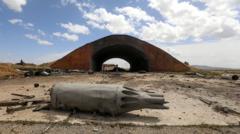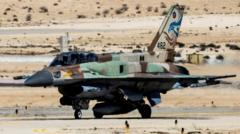Amidst cautious optimism, religious minorities ponder their place in this evolving landscape.
Syria's Easter: A Glimpse into a New Era

Syria's Easter: A Glimpse into a New Era
Easter celebrations in Damascus reflect the challenges and hopes of a post-war Syria under new leadership.
In the heart of Damascus, the Easter Sunday services at the Al Zeitoun cathedral marked a significant moment for the city and its residents. This year’s celebrations held more weight than in the past as they occurred just months after the ousting of President Bashar al-Assad, ending an era of his family's tyrannical rule. The newly appointed President Ahmed al-Shara, a controversial figure with ties to Al-Qaeda, has vowed to lead a more inclusive and tolerant Syria, striving to steady a nation still recovering from years of civil conflict.
With many Sunni Muslim Syrians rallying behind the new government, minorities, particularly Christians, found themselves grappling with uncertainty. For them, Easter symbolized more than just a religious observance; it was a litmus test to evaluate the new regime's commitment to inclusivity, especially since Christians have historically faced persecution.
While the day unfolded with joy and safety in the capital, there remained an undercurrent of concern. As worshipers flocked to the revered cathedrals and churches like Al Zeitoun, the question lingered: would the new government ensure protection for these communities, as Assad had done through his secular policies? The peaceful outcome of the Easter celebrations may serve as a precursor to the broader relationship the new government will forge with Syria’s diverse faith communities in the days to come.
With many Sunni Muslim Syrians rallying behind the new government, minorities, particularly Christians, found themselves grappling with uncertainty. For them, Easter symbolized more than just a religious observance; it was a litmus test to evaluate the new regime's commitment to inclusivity, especially since Christians have historically faced persecution.
While the day unfolded with joy and safety in the capital, there remained an undercurrent of concern. As worshipers flocked to the revered cathedrals and churches like Al Zeitoun, the question lingered: would the new government ensure protection for these communities, as Assad had done through his secular policies? The peaceful outcome of the Easter celebrations may serve as a precursor to the broader relationship the new government will forge with Syria’s diverse faith communities in the days to come.





















